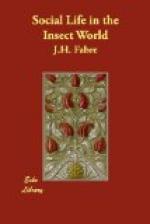CHAPTER XIV
THE GREAT PEACOCK, OR EMPEROR MOTH
It was a memorable night! I will name it the Night of the Great Peacock. Who does not know this superb moth, the largest of all our European butterflies[3] with its livery of chestnut velvet and its collar of white fur? The greys and browns of the wings are crossed by a paler zig-zag, and bordered with smoky white; and in the centre of each wing is a round spot, a great eye with a black pupil and variegated iris, resolving into concentric arcs of black, white, chestnut, and purplish red.
Not less remarkable is the caterpillar. Its colour is a vague yellow. On the summit of thinly sown tubercles crowned with a palisade of black hairs are set pearls of a turquoise-blue. The burly brown cocoon, which is notable for its curious tunnel of exit, like an eel-pot, is always found at the base of an old almond-tree, adhering to the bark. The foliage of the same tree nourishes the caterpillar.
On the morning of the 6th of May a female emerged from her cocoon in my presence on my laboratory table. I cloistered her immediately, all damp with the moisture of metamorphosis, in a cover of wire gauze. I had no particular intentions regarding her; I imprisoned her from mere habit; the habit of an observer always on the alert for what may happen.
I was richly rewarded. About nine o’clock that evening, when the household was going to bed, there was a sudden hubbub in the room next to mine. Little Paul, half undressed, was rushing to and fro, running, jumping, stamping, and overturning the chairs as if possessed. I heard him call me. “Come quick!” he shrieked; “come and see these butterflies! Big as birds! The room’s full of them!”
I ran. There was that which justified the child’s enthusiasm and his hardly hyperbolical exclamation. It was an invasion of giant butterflies; an invasion hitherto unexampled in our house. Four were already caught and placed in a bird-cage. Others—numbers of them—were flying across the ceiling.
This astonishing sight recalled the prisoner of the morning to my mind. “Put on your togs, kiddy!” I told my son; “put down your cage, and come with me. We shall see something worth seeing.”
We had to go downstairs to reach my study, which occupies the right wing of the house. In the kitchen we met the servant; she too was bewildered by the state of affairs. She was pursuing the huge butterflies with her apron, having taken them at first for bats.




